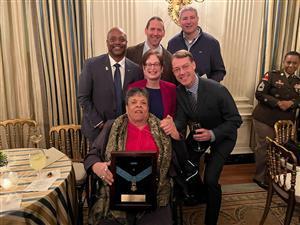The best heroes are ordinary people who accomplish extraordinary deeds. On January 3, 2025, more than 70 years after his death, President Biden awarded the Congressional Medal of Honor to Arlington High School graduate Charlie Johnson (Class of 1951) The Medal of Honor is the United States' highest military award for acts of valor in combat. This long-overdue recognition honors a man whose courage and selflessness exemplified the highest ideals of service and sacrifice.
An American Hero
On June 12, 1953, Charlie Johnson was killed in action at Outpost Harry in the hills of South Korea while single-handedly saving the lives of nine wounded soldiers, including fellow Arlington graduate Donald Dingee (Class of 1950).
Despite his extraordinary bravery, Johnson’s valor went unrecognized at the time. His fellow soldiers later testified that Johnson’s heroism had been overlooked because he was Black, a reflection of the racial inequities of the era.
An Arlington Legacy
In May 2001, five Arlington Middle School students conducted a research project about Arlington High School graduates who were killed during American military conflicts. Their project culminated in a Memorial Day presentation at the Dutchess County War Memorial. When the students recited Charlie’s story, his siblings learned for the first time how their brother had died. They also met Donald Dingee, one of the men whose life Charlie had saved.
The students had no idea their project would correct a 70-year historical injustice, unite families, and inspire an entire community to honor Charlie’s legacy. Their efforts sparked a movement to tell the story of Charlie Johnson, bringing his heroism to light for future generations.
Although Charlie spent only his senior year at Arlington High School after transferring from Millbrook, he made a lasting impression. He served as class vice president, co-captain of the basketball team, and participated in football, baseball, track, band, and chorus. His peers voted him “Most Friendly” and recognized him for displaying the “Best Manners.” He also earned the “Babe Ruth” award for outstanding sportsmanship and fair play.
According to news accounts at the time of his death, Arlington Superintendent Harold Storm said Charlie was “one of the finest and best-liked students we ever had.” His coach, Fritz Jordan, said, “Charles was a gentleman and a great humanitarian. He died as he lived, thinking of his fellow man first.”
Honoring a Hero’s Memory
Since Charlie’s heroism resurfaced in 2001, thousands of Arlington students have learned his story. Arlington students and faculty members created a play titled The Legend of Charlie Johnson. We collaborated with Marist College to produce a video featuring interviews with Don Dingee, Charlie’s siblings, and former classmates. Charlie’s story reaches elementary school students through a children’s book written by retired Traver Road Principal Micah Brown and current Overlook librarian Mindy Gray, with illustrations by Beekman art teacher Kate Thyberg.
In 2007, the Charles Johnson Legacy Project was established with a three-year grant from the Dyson Foundation. The initiative engaged students in character education, history, and diversity appreciation activities inspired by Charlie’s values.
Advocacy for the Medal of Honor
In 2004, Charlie’s family, former classmates, Arlington administrators, and the men he saved began lobbying Congress to award him the Medal of Honor. The effort gained national attention in 2010 when actors Gary Sinise and Dennis Haysbert performed a dramatic reading about Charlie’s heroism at the Capitol Memorial Day Concert in Washington, D.C. Following the performance, General Colin Powell spoke about the Charles Johnson Legacy Project, which urged Arlington students to live a “Charlie Johnson Moment”— helping others without expecting a reward.
That same year, Arlington High School dedicated Johnson Hall and the Wall of Remembrance, honoring alumni who perished in military service. A statue of Charlie saving Don Dingee, designed and created by retired Arlington art teacher Arden Witherwax and donated by Arlington alumni, was also unveiled. It features eight character traits that define Charlie: loyalty, brotherhood, selflessness, courage, compassion, responsibility, patriotism, and integrity.
Charlie was posthumously awarded the Silver Star during the dedication, though many continued advocating for the Medal of Honor. The Silver Star Medal is the United States Armed Forces's third-highest military decoration for valor in combat.
In 2021, Congress passed a resolution waiving the requirement that the Medal of Honor be awarded within five years of the action it recognizes. This allowed a Pentagon review of Charlie’s case, an effort championed by former Representatives Chris Gibson and Antonio Delgado, and later by Congressman Pat Ryan.
In reflecting on the remarkable legacy of Charlie Johnson, Arlington Superintendent, Dr. Phil Benante eloquently captured the enduring impact of his heroic actions:
"Charlie Johnson's heroic actions saved his classmate and other men in his company during the Korean War. The study of his life and character has positively influenced thousands of Arlington students through the Charlie Johnson Legacy Project. Our students, educators, and community members have worked for over twenty years to advocate for Charlie to be honored with the Medal of Honor and today we feel an immense sense of pride and gratitude in knowing that Charlie has been appropriately honored for his acts of valor at Outpost Harry on June 12, 1953."
A Legacy That Inspires
Arlington High School continues to honor Charlie’s memory with the annual Charlie Johnson Award, given to graduating seniors who exemplify his values. The Arlington Education Foundation also awards a scholarship to a graduate who has demonstrated these traits throughout high school.
The research project of five middle school students brought long-overdue comfort to a grieving family, corrected a historical wrong, and touched the lives of thousands. Charlie’s story reminds us that ordinary people can make an extraordinary difference. Whether through acts of courage, advocacy, or education, we all have the power to leave a lasting impact on the world.

